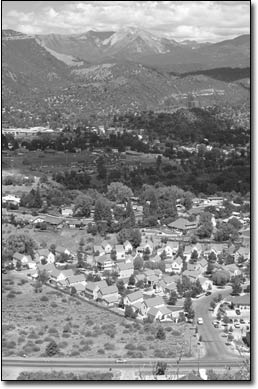|
Council members fear initiative could backfire
and lead to more sprawl
by Will Sands
 |
| Members of the Durango City
Council are not viewing the proposed Responsible Growth
Initiative as a solution to local growing pains. Instead
they fear the ballot measure may
inhibit democracy and create more sprawl outside city limits./Photo
by Todd Newcomer. |
Petitioners are currently making the rounds in Durango and
trying to get a Responsible Growth Initiative on this November's
ballot. Meanwhile, local elected officials have taken a hard
look at the initiative intended to control growth in Durango
and did not like what they saw. Members of Durango City Council
are calling the proposed ballot initiative "ill-conceived," something
that will "hamstring local government" and ultimately "exacerbate
the sprawl problem we're facing."
Proposed by the Friends of the Animas Valley, the initiative
would essentially ask Durango voters to approve annexing certain
types of property inside city limits (see sidebar). On June 10,
City Clerk Linda Yeager released petitions for the initiative,
and the group must collect the signature of 553 registered voters
before July 12.
Renee Parsons, FOAV president, has stated that the measure would
encourage smart growth by getting local citizens more involved
in the planning process. "We don't consider this as anti-growth
or no-growth," she said in late May. "It's just an avenue to
get city voters to be part of the process."
Since that time, members of the Durango City Council have had
an opportunity to take a careful look at the initiative, and
the board does not endorse it. "I think it's an ill-conceived
idea, and I don't think the public should support it," said Mayor
Joe Colgan.
Council member Virginia Castro agreed, saying, "I think it's
well-intentioned but misguided."
And council member Dale Garland concluded, "I think this initiative
makes us ask some questions, which is good. I don't think that
this legislation is the solution."
Colgan, Castro and Garland concurred that a principle reason
the initiative would be problematic is the lack of similar controls
outside city limits in La Plata County. They said that developers
would be more inclined to try their hand at the La Plata County
planning process than face a time-consuming election. And the
members of council expressed concern that the initiative would
actually encourage sprawl rather than control it.
"I think developers will just take the path of least resistance
and go to the county, where there would be no parallel legislation," Garland
said.
Colgan added, "The development will take place in the county
anyway. If we do things close in to the city, we've got a chance
to explore alternatives on things like transportation."
Castro agreed that the development would happen anyway. She
also noted that an election costs the city between $8,000 and
$10,000, and that cost would be indirectly passed onto voters.
"If the initiative actually makes it onto the ballot and passes,
it's going to cost the city a lot of money, push growth further
out into the county and exacerbate the sprawl problem we're facing," Castro
said.
 |
| Graig Shearer, of Colorado
Construction and Renovation, fastens a joist to a support
beam at the Ptarmigan Center, a retail/housing development
on Florida
Road on Tuesday. Council members agree growth is a local
issue, but they feel the
city is already doing a good job of managing it./Photo by
Todd Newcomer. |
Another criticism that Colgan and Garland had of the Responsible
Growth Initiative is its challenge to representative government.
In particular, they suggested that putting developments to election
would cater to special interests.
"We have a representative government in this country," Colgan
said. "There are ways to deal with elected officials if they're
not doing what the majority of voters want. If you start doing
things by initiative you get control by special interests rather
than the people who were voted into office."
Garland added, "This actually runs contrary to democracy and
becomes special interests that are running government."
All three agreed that Durango is currently facing strong growth
pressures. However, they also said that the city is doing a respectable
job of managing the growth.
"We need to manage and control the growth," Colgan said. "But
do you think the average citizen is going to take the time to
learn all the details of an annexation? I think we've taken a
pretty responsible approach to it. We've annexed only a part
of the Grandview area and limited it to the amount of infrastructure
that's available."
Colgan concluded, "The city has strict development standards,
4 and we think it's made Durango a pretty nice place to live."
Garland commented on the inevitably of people moving to desirable
areas, saying, "I know people are going to come here no matter
what we do. I don't think we have a growth problem. I think we
just need to figure out how to manage it."
And on the subject of managing growth, Castro mentioned a recent
move by the council that she said seems to be becoming a distant
memory. She reiterated that in February of this year, the council
voted against annexing River Trails Ranch and enabling the development
of 800 new homes just north of Durango in the Animas Valley.
"Our current process does work, particularly in light of River
Trails Ranch, where the council effectively defeated that development," she
said. "I really take issue when people suggest that our planning
process is somehow flawed or inadequate."
Council members Sidny Zink and Aaron Tucson were not available
for comment.
|